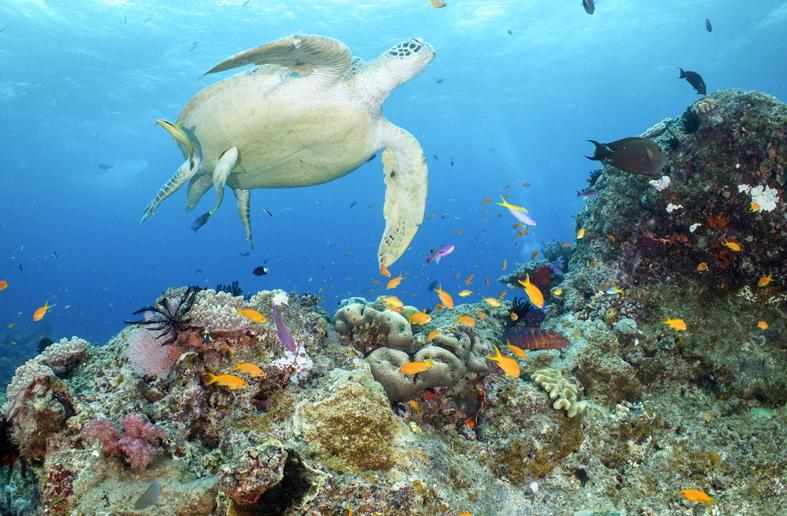Australia yesterday unveiled a A$1 billion (US$701.9 million) package to protect the climate-ravaged Great Barrier Reef, hoping to prevent the vast network of corals from being removed from UNESCO’s World Heritage list.
Australian Prime Minister Scott Morrison announced the nine-year plan months after narrowly avoiding the reef being placed on UNESCO’s List of World Heritage in Danger.
“We are backing the health of the reef and the economic future of tourism operators, hospitality providers and Queensland communities that are at the heart of the reef economy,” Morrison said.

Photo: AP
The move comes ahead of a general election expected in May, when Morrison would have to win key Queensland seats near the reef to remain in power.
When the UN in 2015 threatened to downgrade the reef’s World Heritage listing, Australia created the “Reef 2050” plan and poured billions of dollars into protection.
The measures are believed to have arrested the pace of decline, but much of the world’s largest reef system has already been damaged.
A study last year found that bleaching had affected 98 percent of the reef since 1998, leaving just a fraction of it untouched.
The Morrison administration’s support for coal and reluctance to tackle climate change has seen his Liberal Party bleed support in major cities and prompted the emergence of a string of electoral challenges from climate-focused independents.
Australians are overwhelmingly in favor of action to limit climate change, having experienced a string of warming-worsened disasters from bushfires to droughts and floods.
A poll by Sydney’s Lowy Institute last year found that 60 percent of Australians believed “global warming is a serious and pressing problem.”
About 80 percent of Australians supported a net-zero emissions target by 2050, which Canberra reluctantly adopted ahead of a landmark UN climate summit in Glasgow, Scotland, last year.
One of the world’s biggest exporters of coal and gas, Australia’s economy is heavily reliant on fossil fuels.
Its political parties also receive significant funds from coal and gas-linked donors.

‘SHORTSIGHTED’: Using aid as leverage is punitive, would not be regarded well among Pacific Island nations and would further open the door for China, an academic said New Zealand has suspended millions of dollars in budget funding to the Cook Islands, it said yesterday, as the relationship between the two constitutionally linked countries continues to deteriorate amid the island group’s deepening ties with China. A spokesperson for New Zealand Minister of Foreign Affairs Winston Peters said in a statement that New Zealand early this month decided to suspend payment of NZ$18.2 million (US$11 million) in core sector support funding for this year and next year as it “relies on a high trust bilateral relationship.” New Zealand and Australia have become increasingly cautious about China’s growing presence in the Pacific

Indonesia’s Mount Lewotobi Laki-Laki yesterday erupted again with giant ash and smoke plumes after forcing evacuations of villages and flight cancelations, including to and from the resort island of Bali. Several eruptions sent ash up to 5km into the sky on Tuesday evening to yesterday afternoon. An eruption on Tuesday afternoon sent thick, gray clouds 10km into the sky that expanded into a mushroom-shaped ash cloud visible as much as 150km kilometers away. The eruption alert was raised on Tuesday to the highest level and the danger zone where people are recommended to leave was expanded to 8km from the crater. Officers also

The team behind the long-awaited Vera Rubin Observatory in Chile yesterday published their first images, revealing breathtaking views of star-forming regions as well as distant galaxies. More than two decades in the making, the giant US-funded telescope sits perched at the summit of Cerro Pachon in central Chile, where dark skies and dry air provide ideal conditions for observing the cosmos. One of the debut images is a composite of 678 exposures taken over just seven hours, capturing the Trifid Nebula and the Lagoon Nebula — both several thousand light-years from Earth — glowing in vivid pinks against orange-red backdrops. The new image

ESPIONAGE: The British government’s decision on the proposed embassy hinges on the security of underground data cables, a former diplomat has said A US intervention over China’s proposed new embassy in London has thrown a potential resolution “up in the air,” campaigners have said, amid concerns over the site’s proximity to a sensitive hub of critical communication cables. The furor over a new “super-embassy” on the edge of London’s financial district was reignited last week when the White House said it was “deeply concerned” over potential Chinese access to “the sensitive communications of one of our closest allies.” The Dutch parliament has also raised concerns about Beijing’s ideal location of Royal Mint Court, on the edge of the City of London, which has so